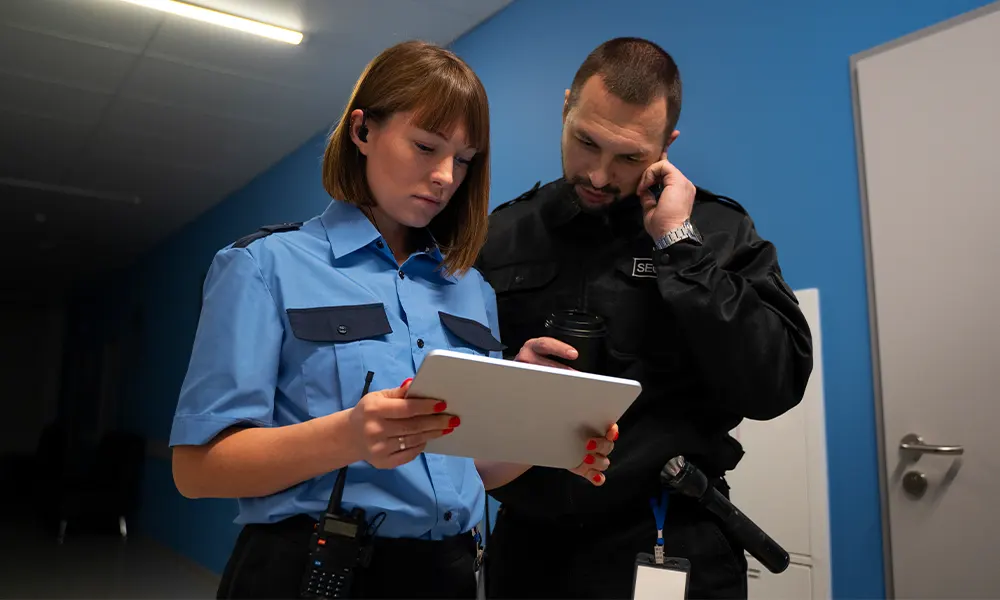Have you ever considered the silent guardians who stand between the tranquillity of our surroundings and potential chaos? Who are the dedicated individuals responsible for ensuring our homes, workplaces, and public spaces remain safe and secure? This comprehensive exploration will delve into the intricate world of security guard duties, security guard responsibilities, and security officer roles, shedding light on their critical role in our daily lives.
General Roles and Responsibilities:
Protecting People and Property
Security guards, often unsung heroes, are responsible for safeguarding us and our possessions. One of their most crucial tasks is to maintain a visible presence, acting as a deterrent to potential criminals. This duty encompasses their physical presence and role as the emergency first responders. When trouble strikes, they’re the ones who step in to ensure our safety, acting as a buffer between danger and those we protect.
Maintaining Order and Safety
Beyond their role as protectors, security guards are also responsible for maintaining order and safety. They enforce rules and regulations, ensuring that individuals within a given environment adhere to established guidelines. This responsibility extends to crowd control during events and managing access control, which plays a pivotal role in preventing unauthorised entry and exit, a fundamental aspect of security management.
Reporting and Documenting Incidents
Security guards are meticulous record-keepers. Their role includes writing detailed incident reports and collecting valuable evidence. These reports serve as a critical link in the chain of evidence, often aiding law enforcement in their investigations. Furthermore, maintaining open lines of communication with law enforcement agencies is vital to ensuring that information flows seamlessly, contributing to the overall security framework.
Specific Duties and Responsibilities:
Patrolling and Surveillance
Security guards’ daily routines frequently involve patrolling designated areas. These regular patrols serve multiple purposes. Firstly, they act as a preventive measure, as potential wrongdoers are less likely to commit crimes when they know they are being watched. Secondly, they allow for the early detection of suspicious activities. Monitoring security cameras and alarms is another essential component of this duty, as it provides an additional layer of vigilance, ensuring that nothing goes unnoticed.
Access Control
Security guards are often the first point of contact at entrances and exits. Their role in checking identification and credentials is pivotal in preventing unauthorised individuals from accessing secured areas. This responsibility is a cornerstone of security management, as it is the first line of defence against potential intrusions.
Emergency Response
Security guards act when alarms sound or distress calls come in. Their swift response is crucial in mitigating potential disasters and ensuring the safety of individuals within their purview. Beyond their protective duties, security officers are often trained to provide first aid, making them indispensable in emergencies.
Communication
Security guards maintain constant communication through radio or other devices. This level of connectivity allows them to coordinate with their peers effectively and respond rapidly to emerging situations. This aspect of their role significantly enhances their ability to maintain security, as information can be disseminated promptly, and actions can be coordinated in real time.
Customer Service
While often associated with their protective roles, security guards also serve as ambassadors of hospitality and customer service. They assist visitors and clients, providing information and directions when needed. This friendly and welcoming demeanour adds extra comfort and security to the environments they safeguard.
Conflict Resolution
Security officers are trained to maintain security, de-escalate tense situations, and resolve disputes peacefully. Their ability to handle conflicts without force is invaluable, as it ensures that minor disagreements do not escalate into major incidents.
Legal and Ethical Responsibilities:
Adhering to laws and regulations is non-negotiable for security guards. Understanding use-of-force guidelines, privacy laws, and licensing requirements is essential for carrying out their duties responsibly and lawfully. Ethical conduct is equally paramount, treating all individuals with respect, maintaining confidentiality, and avoiding conflicts of interest.
Training and Professional Development
Security guard careers begin with comprehensive initial training that equips them with the skills and knowledge necessary to excel in their roles. However, the learning journey doesn’t stop there. Ongoing training and certification are essential for keeping security officers up-to-date with the latest security protocols and best practices. Advancement opportunities exist for those seeking to climb the security industry’s ladder, including supervisory and management roles.
Conclusion
In a world often dominated by headlines of chaos and crime, security guards remain the unsung heroes who work tirelessly to keep us safe. Their roles and responsibilities extend far beyond what meets the eye, encompassing everything from protecting people and property to ensuring the highest standards of legality and ethics.
As we reflect on the multifaceted world of security guard duties, security guard responsibilities, and security officer roles, one thing becomes abundantly clear: they are the guardians of our peace and security. Let us take a moment to appreciate their unwavering commitment and dedication to maintaining order in an increasingly complex world.
If you’re looking to enhance the security of your home, workplace, or event, consider Accord Security. Our team of dedicated security professionals is committed to providing high-quality security services to meet your specific needs. Contact us today for a consultation and take the first step toward a safer and more secure environment. Your safety is our priority.
